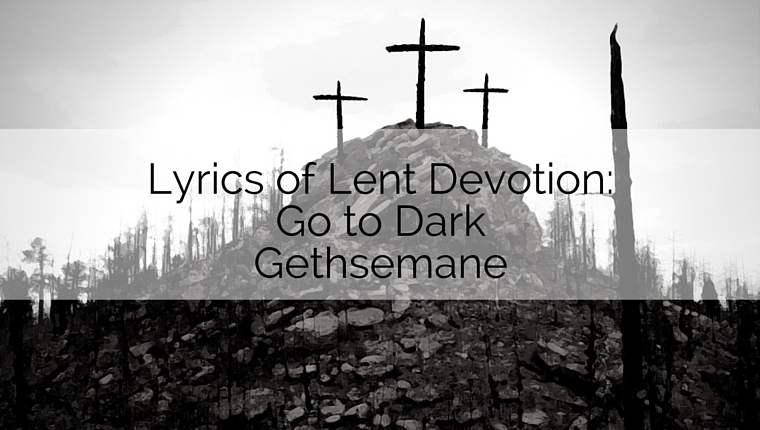Lyrics of Lent Devotion Series
One of the seasons of the church year that has made the greatest impact on me as I was growing up was the season of Lent. While I can wax nostalgic about many things connected to this time in the liturgical year, the hymns are what pull it all together for me. Not only are the melodies stirring, but the power in the words point me to my Savior. Join me as I take a closer look at the lyrics of Lent.
Go to dark Gethsemane,
All who feel the tempter’s pow’r;
Your Redeemer’s conflict see,
Watch with Him one bitter hour;
Turn not from His griefs away;
Learn from Jesus Christ to pray.
As a visual learner, words serve as a platform in which I can display scenes in my imagination. The words of James Montgomery’s hymn, “Go To Dark Gethsemane,” allow me to easily visualize the events that lead to Christ’s sacrifice. From the words written in the Gospels (Matthew 26, Mark 14, Luke 22), I can picture the events of Jesus praying in the Garden of Gethsemane.
One of the things that I truly appreciate in regards to the writing of this hymn, is the way in which James Montgomery points to Jesus as the ultimate example. “Since then we have a great high priest who has passed through the heavens, Jesus, the Son of God, let us hold fast our confession. For we do not have a high priest who is unable to sympathize with our weaknesses, but one who in every respect has been tempted as we are, yet without sin. Let us then with confidence draw near to the throne of grace, that we may receive mercy and find grace to help in time of need.” (Hebrews 4:14-16)
Follow to the judgment hall,
View the Lord of life arraigned;
Oh, the wormwood and the gall!
Oh, the pangs His soul sustained!
Shun not suff’ring, shame, or loss;
Learn from Him to bear the cross.
Calv’ry’s mournful mountain climb;
There, adoring at His feet,
Mark that miracle of time,
God’s own sacrifice complete.
“It is finished!” hear Him cry;
Learn from Jesus Christ to die.
Not long after the harsh scene at Gethsemane, does the hymn writer take us to the injustice of Jesus’ trials and the brutality of His crucifixion. Reading through these words, I stand as an inept bystander watching my Lord take on my guilt, my shame, and my punishment. All this He does out of love for me.
“He was oppressed, and he was afflicted,
yet he opened not his mouth;
like a lamb that is led to the slaughter,
and like a sheep that before its shearers is silent,
so he opened not his mouth.
By oppression and judgment he was taken away;
and as for his generation, who considered
that he was cut off out of the land of the living,
stricken for the transgression of my people?
And they made his grave with the wicked
and with a rich man in his death,
although he had done no violence,
and there was no deceit in his mouth.
Yet it was the will of the Lord to crush him;
he has put him to grief;
when his soul makes an offering for guilt,
he shall see his offspring; he shall prolong his days;
the will of the Lord shall prosper in his hand.
Out of the anguish of his soul he shall see and be satisfied;
by his knowledge shall the righteous one, my servant,
make many to be accounted righteous,
and he shall bear their iniquities.
Therefore I will divide him a portion with the many,
and he shall divide the spoil with the strong,
because he poured out his soul to death
and was numbered with the transgressors;
yet he bore the sin of many,
and makes intercession for the transgressors.” (Isaiah 53:7-12)
Early hasten to the tomb
Where they laid His breathless clay;
All is solitude and gloom.
Who has taken Him away?
Christ is ris’n! He meets our eyes.
Savior, teach us so to rise.
The story and the song does not end at the cross, but bursts forth beyond the tomb. New life was given to all that glorious Easter morning. And we can celebrate that life every morning. “Do you not know that all of us who have been baptized into Christ Jesus were baptized into his death? We were buried therefore with him by baptism into death, in order that, just as Christ was raised from the dead by the glory of the Father, we too might walk in newness of life. For if we have been united with him in a death like his, we shall certainly be united with him in a resurrection like his. We know that our old self was crucified with him in order that the body of sin might be brought to nothing, so that we would no longer be enslaved to sin. For one who has died has been set free from sin. Now if we have died with Christ, we believe that we will also live with him. We know that Christ, being raised from the dead, will never die again; death no longer has dominion over him. For the death he died he died to sin, once for all, but the life he lives he lives to God. So you also must consider yourselves dead to sin and alive to God in Christ Jesus.” (Romans 6:3-11)






0 Comments